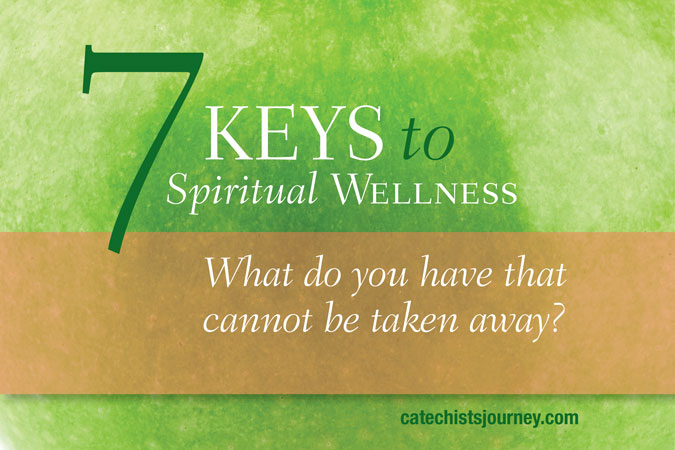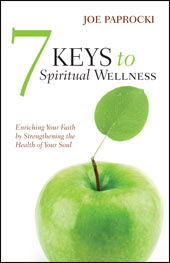
Editor’s note: This post is one in a series inspired by Joe Paprocki’s book 7 Keys to Spiritual Wellness. In the book, Joe introduces each key with a fun or thought-provoking question. Each Friday we’ll share an excerpt from 7 Keys to Spiritual Wellness that poses a question, followed by a response by a catechist or catechetical leader.
What do you have that cannot be taken away?
If you can identify and cultivate the answer to that question, you’ll be on your way to spiritual wellness. If you lose sight of it, you’ll be opening the door of your soul to a host of unwelcome little gremlins that can mess you up. A great deal of our unhappiness in life can be traced to our fears about losing that which we have: possessions, status, talents, and so on. We become consumed with insecurity, which in turn breeds rivalry and competition. The problem is that we end up constantly comparing ourselves to rivals and competitors, measuring our self-worth by how we stack up next to them. Their gifts, their talents, and their successes threaten our self-worth. The only joy we find is either in our own triumphs or their defeats.
That’s why the second key to spiritual wellness—actively seeking the good of others—begins with focusing on what you have that cannot be taken away. This allows you to truly enjoy and contribute to the good fortune of others, content and secure in your own skin. If something cannot be taken away from you, then you have no reason to be insecure. Others will no longer appear to you as rivals, and life will not seem like one big competition. You will be breeding contentment.
I want to make one clarification. We cannot strive for justice without engaging in some comparisons. There are too many examples in life of gross injustices and inequities: some people are benefiting while many others are being unjustly deprived. Such comparisons can lead us to fight for social justice, where we actively seek the good of others by transforming society. The difference is that a comparison for justice’s sake can lead us to productively seek the good of others instead of moving us into isolation and apathy. When working for social justice, we are not motivated by ill feelings toward the “haves,” but by the desire to see that the “have-nots” receive what God intended.
—7 Keys to Spiritual Wellness by Joe Paprocki
What We Really Need
We all suffer from what St. Ignatius would call “disordered affections”: material and personal attributes that we think we cannot live without. The affections shield us from the fact that we are totally reliant on the grace of God, that without him we are nothing. We’d rather be perceived as people who have our act together. While the Christian life calls us to become people who “practice love of neighbor even at the cost of self-renunciation” (Rite of Christian Initiation for Adults #75), we’d rather practice self-indulgence than self-renunciation.
Self-indulgence can take on many forms, such as the need to be right all the time or the desire to appear successful financially or professionally. It can appear as various addictions—shopping, eating, or over-exercising, for instance.
How can we be free of these disordered affections? I would suggest taking advantage of the gift of the grace of the sacraments.
In the Sacrament of Reconciliation, we can bring to confession all those habits that keep us from seeing the image of God in ourselves and others. A good confession takes us down to the naked truth of our inner lives. Don’t discount our need for that.
If you are married, the Sacrament of Matrimony calls you to assist your spouse on the journey to holiness. Don’t discount the mutual help a good relationship offers. The Sacrament of Matrimony helps us practice self-reliance by focusing not on our needs, but the needs of our spouse.
Through regular participation in the Eucharist, you can be changed by Word and sacrament into a person of self-giving love. Listen to Scriptures with openness and offer yourself along with the gifts of bread and wine to be changed, so that you can become more like Christ. Listen to the prayers of the Mass as they redirect your attention to what truly matters:
May these mysteries, O Lord,
in which we have participated,
profit us, we pray,
for even now, as we walk amid passing things,
you teach us by them to love the things of heaven
and hold fast to what endures.
(Prayer After Communion on the First Sunday of Advent)
When we practice self-renunciation, we realize that all we really need are the things of heaven: the love of God, the promise of salvation, and our everlasting identity as children of God. And these are things that can never be taken away.
 Get the book that inspired this series! Purchase 7 Keys to Spiritual Wellness by Joe Paprocki at LoyolaPress.com.
Get the book that inspired this series! Purchase 7 Keys to Spiritual Wellness by Joe Paprocki at LoyolaPress.com.



Yes, the gift of faith is the greatest gift we have been given. In this we are called as catechist to share that gift not only to our students but to all we meet by the lives we live. The Eucharist and sacrament of reconciliation help us to grow to be stronger and stronger in our own faith so that we can share it with others esp. By the way we live.
Yes my gift of faith is very precious to me. The love of Jesus keeps me going. His words Love the Lord thy God
with you all your heart and love thy neighbor as thy self.
The constant presence of God, under whose wings I feel protected will never be taken away from me.
Teaching faith formation is a wonderful way to reach the children of our church community. It is a wonderful experience for me to teach it and to renew my own knowledge of our Catholicism.
Gods love for me and our relationship cannot be taken away. What I have with him is how I live and breath and no one can take it. I cannot imagine what life without him can be as he always with me until the end!
My parents never remembered my birthday, but they remembered all seven siblings birthdays. I felt very hurt while growing up. One day I decided to give a present to someone who needed encouragement on my birthday. God provided the person (I did not know them nor did I see them again) my heart flooded with joy, such joy, that I have continued the practice. God gave me they joy and that joy cannot be taken away.